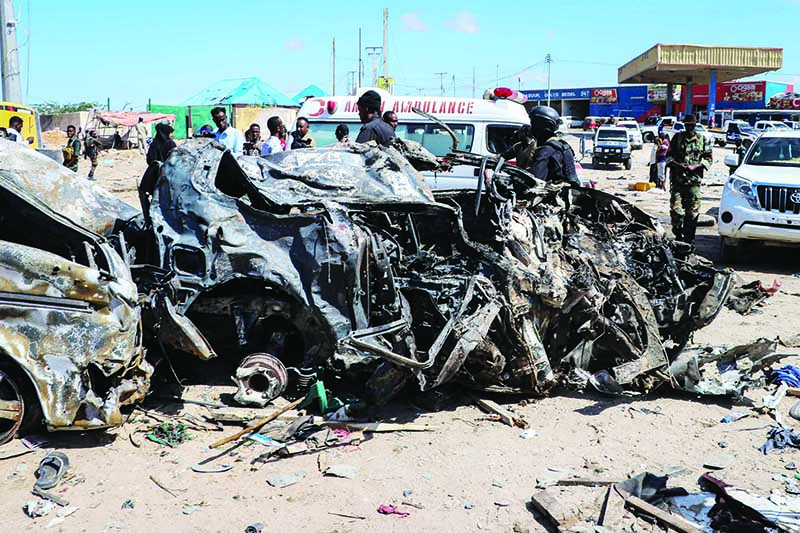
MOGADISHU: A
massive car bomb exploded in a busy area of Mogadishu yesterday, leaving at
least 78 people dead, many of them university students, in Somalia's deadliest
attack in two years. The blast occurred at a busy intersection southwest of the
Somali capital where the presence of a security checkpoint and a tax office
often cause traffic jams. Scores of wounded were carried on stretchers from the
site, where the force of the explosion left the charred and twisted remains of
vehicles.
The attack has
not been claimed, however Mogadishu is regularly hit by car bombings and
attacks waged by Al-Shabaab Islamist militants allied to Al-Qaeda. President
Mohamed Abdullahi Farmaajo condemned the attack in comments carried by the
Somalia national news agency SONNA. "This enemy works to implement the
destructive will of international terrorism, they have never done anything
positive for this our country, they have not constructed a road, never built
hospitals and not education centers as well," he said. "All they do
is destruction and killing and the Somali public are well informed about
this."
Many of those
killed are believed to be university students whose bus was hit by the blast.
Two Turkish nationals also died, police said. "The number of the dead from
the blast is still increasing, we now have 78 dead and 125 injured," the
director of the private Aamin Ambulance service, Abdukadir Abdirahman Haji,
told AFP. Police officer Ibrahim Mohamed described the explosion as
"devastating".
"We have
confirmed that two Turkish nationals, presumably road construction engineers
are among the dead, we don't have details about whether they were passing by
the area or stayed in the area," he said. Turkey's defense ministry wrote
on Twitter it had sent a military plane "loaded with emergency aid
equipment... in order to provide emergency aid to our Somali brothers injured
in the despicable terror attack in Somalia".
Sakariye
Abdukadir, who was near the area when the car bomb detonated, said the blast
"destroyed several of my car windows". "All I could see was
scattered dead bodies... and some of them burned beyond recognition."
Prime Minister Hassan Ali Khiere appointed an emergency committee to work on
providing help to those who have been wounded in the blast.
"We will
seek medical assistance outside the country for those whose health situation
cannot be dealt with inside the country. We are calling on the Somali public
both, inside and outside the country to take part in assisting the victims, and
to stand together in the fight against Al-Shabaab", the prime minister
told Radio Mogadishu.
Mogadishu's mayor
Omar Mohamud Mohamed told a news conference that the exact number of dead was
not yet known. "We will confirm the exact number of the number of the dead
later but it is not going to be small, most of the dead were innocent
university students and other civilians," he said. Witness Muhibo Ahmed
said the attack was a "devastating incident because there were many people
including students in buses who were passing by the area when the blast
occurred".
Mogadishu is
regularly hit by attacks by the Shabaab, which has fought for more than a
decade to topple the Somali government. The militant group emerged from the
Islamic Courts Union that once controlled central and southern Somalia and is
variously estimated to number between 5,000 and 9,000 men. In 2010, the Shabaab
declared their allegiance to Al-Qaeda.
The following
year, its fighters fled positions they once held in the capital Mogadishu, and
have since lost many strongholds. But they retain control of large rural
swathes of the country and continue to wage a guerrilla war against the
authorities, managing to inflict bloody death tolls in attacks at home and abroad.
Two weeks ago, five people were killed when Shabaab militants attacked a
Mogadishu hotel popular with politicians, army officers and diplomats in an
hours-long siege.
Since 2015, there
have been 13 attacks in Somalia with death tolls above 20. Eleven of these have
been in Mogadishu, according to a tally of AFP figures. All of them involved
car bombs. The deadliest attack in the country's history was a truck bombing in
October 2017 in Mogadishu which left 512 people dead and around 295 injured. -
AFP
.jpg)



